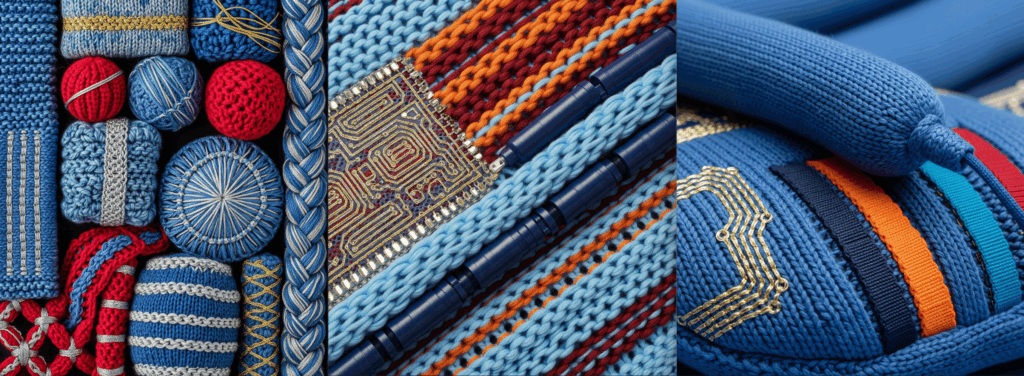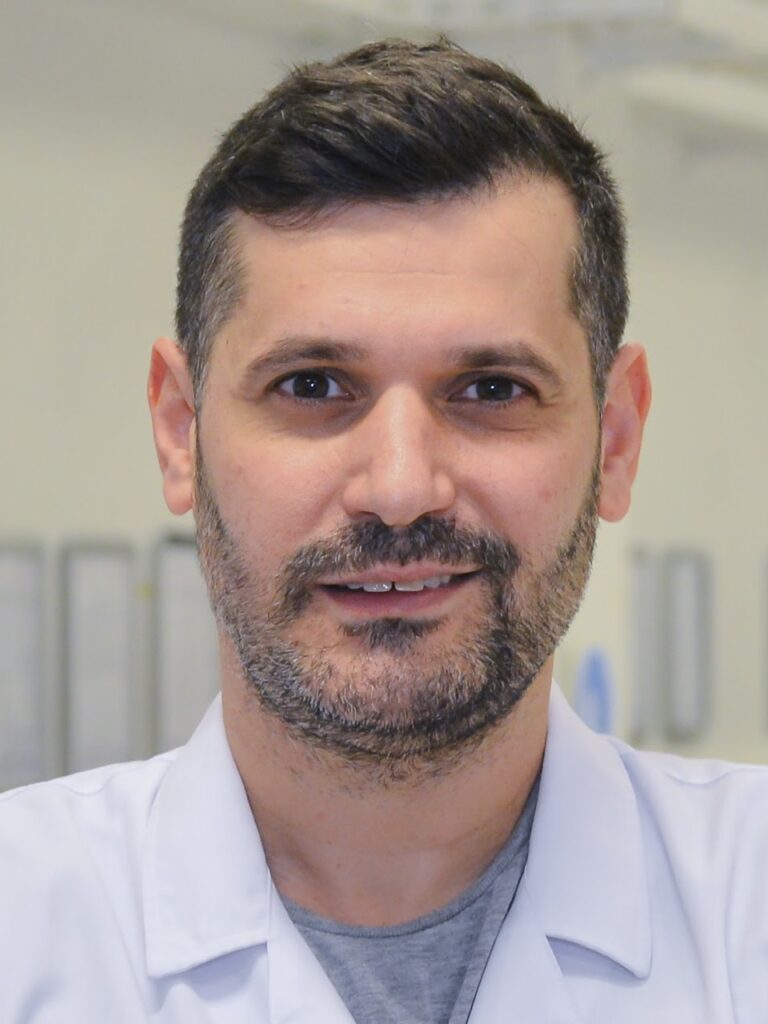The integration of textile technologies in robotics ha s gained significant attention in recent years due to several key factors that make textiles an appealing choice for robotic applications. Traditional robots are often rigid, which limits their ability to interact safely and effectively with humans and delicate objects. Textiles, inherently flexible and soft, are ideal for creating robotic components like grippers or exoskeletons. Such soft robots can mimic the natural movement of muscles and tendons, making them more adaptable to various tasks and environments. Textile-based robots can bend, stretch, compress, and twist, allowing for a greater range of motion while not compromising on robustness. This flexibility is particularly useful in applications that require robots to navigate complex, irregular, or confined spaces. Textiles can be designed as garments or accessories, directly and naturally following the body’s movements, making them ideal for applications that require close contact with the skin, such as in rehabilitation. This feature is particularly important in wearable robotics, where comfort and ergonomics are critical for user acceptance.
In this workshop, we address the versatility of using textiles in robotics and ignite an exchange between researchers of all stages for future directions in this emerging domain. We aim to explore opportunities together from diverse viewpoints, gaining insights from a textile fabrication viewpoint, as well as touching on challenges in material innovation.


Guoying Gu
Professor at Shanghai Jiao Tong University (SJTU)
Guoying Gu received the B.E. degree (with honors) in electronic science and technology, and the Ph.D. degree (with honors) in mechatronic engineering from Shanghai Jiao Tong University, Shanghai, China, in 2006 and 2012, respectively. Since October 2012, Dr. Gu has worked at Shanghai Jiao Tong University, where he is currently appointed as the Dean and a Distinguished Professor of School of Mechanical Engineering. Dr. Gu was the recipient of the National Science Fund for Distinguished Young Scholars and the XPLORER PRIZE. He was a Humboldt Fellow with University of Oldenburg, Germany. He was a Visiting Scholar at Massachusetts Institute of Technology, National University of Singapore and Concordia University. His research interests include soft robotics, bioinspired and wearable robots, smart materials sensing, actuation and motion control. He is the author or co-author of over 150 publications, which have appeared in Science Robotics, Nature Biomedical Engineering, Nature communications, Science Advances, and etc. He is currently an Associate Editor for Soft Robotics and was an Associate Editor for IEEE Transactions on Robotics and IEEE Robotics and Automation Letters.

Ozgur Atalay
Professor at Istanbul Technical University (ITU)
Ozgur Atalay is an Associate Professor and Head of the Soft Sensors Lab at Istanbul Technical University. As such, he is also the grantee of multiple ERC funded projects. After completing his PhD at Manchester University, UK and his postdoctoral research at Harvard University, US, he has received the Marie Curie Individual Fellowship in 2019 as part of the EU Horizon 2020 program. Currently, the European Commission is funding his “TEXWEAROTS” project with an ERC Grant. This project summarises also Dr. Atalay’s research interests, exploring textile based wearable soft robotics with integrated sensing, actuating, as well as self-powering properties. The Soft Sensors Lab further specializes in sustainable electronic textiles, soft robotics, and the integration of machine learning and the Internet of Things (IoT).
The workshop will take place in the morning of the 20th October, and will feature some hands on tutorials on smart textiles, as well as talks by experts in the field of soft robotics and textile engineering.
| Time | Activity/Talk | Speaker/Coordinator |
|---|---|---|
| 09:00 – 09:15 | Introduction | Organizers |
| 09:15 – 09:35 | “Fabric-based pneumatic soft actuators and robots” | Guoying Gu |
| 09:35 – 09:55 | “A new pathway for manufacturing soft robotics: TEXWEAROTS” | Ozgur Atalay |
| 09:55 – 10:30 | Lightning Talks | Accepted Abstracts |
| 10:30 – 11:00 | Tea and Coffee Break | |
| 11:00 – 11:30 | Demo & Poster Session | |
| 11:30 – 12:40 | Hands On Session: making a textile sensor and actuator | Sophie Skach |
| 12:40 – 12:55 | Award Ceremony for best poster and demo | |
| 12:55 – 13:00 | Closing Remarks by the organizers | Organizers |
Congratulations to the accepted contributions, in alphabetical order:
We invite you to participate and to submit an extended abstract of maximum 2 pages in IEEE conference paper format before September 8th, 2025 to textilerobotics@bioroboticsinstitute.it !
The highest quality and most innovative contributions will be invited for a full paper submission for a Special Issue of the IEEE Transactions on Medical Robotics and Bionics (T-MRB), with support from the journal’s Editor-in-Chief, Prof. Paolo Dario.
Further, we also give out monetary awards for the best contribution, sponsored by our partner ISTITUTO MODARTECH.
Topics of interests include, but are not limited to:
We look forward to your submissions, and to a fruitful exchange during the workshop! Hopefully see you in Hangzhou!
For any questions and clarifications, please contact Sophie Skach on sophie.skach@santannapisa.it